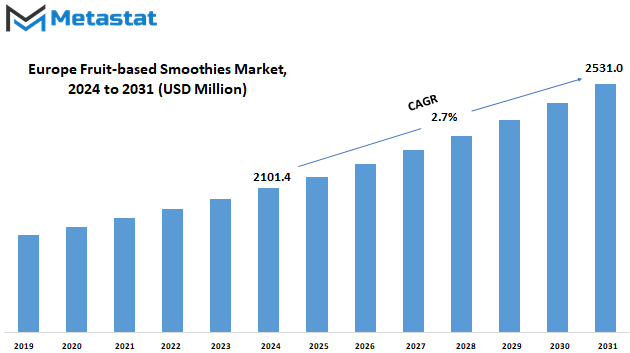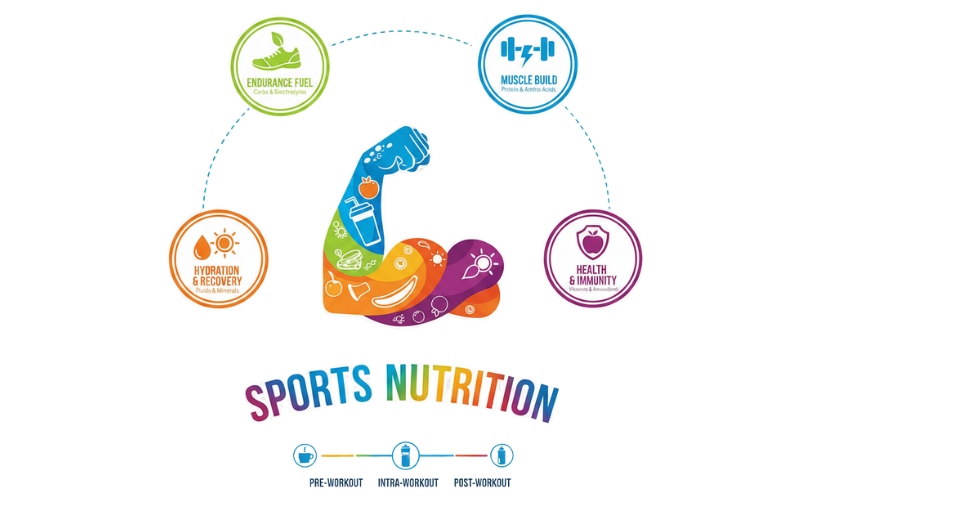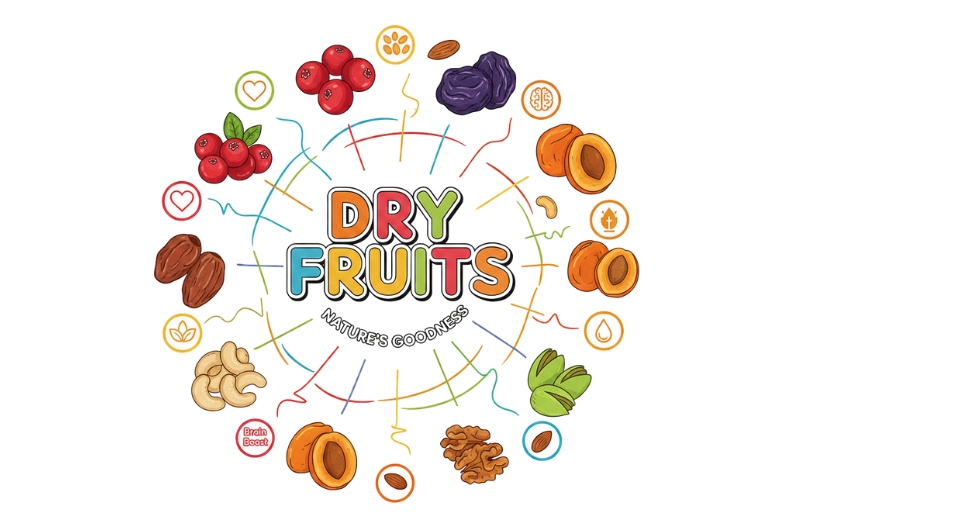MARKET OVERVIEW
The Europe fruit-based smoothies market finds support through the food culture of the region, robust network of distribution channels, and fresh produces. The food and beverage industries are well spread across the entire continent of Europe and thus always provide strong bases for growth and development in the fruit-based smoothie market. Some major contributors to the market include countries like United Kingdom, Germany, France, and Spain, where consumers are increasingly taking smoothies as part of their regular consumption. This is further supported in Europe, as people here have a long tradition of enjoying superior-quality fruits and fresh ingredients.
The beverage industries view one of the sectors in Europe fruit-based smoothies market. It is a class of drinks that focuses on nutritional, flavorful beverages made from fresh fruits. For years, this market witnessed a shift in demand as people look for healthier options and alternative rather than opting for sugary or carbonated drinks. Fruit-based smoothies have gradually captured a heightened preference in the beverage market because of the use of natural ingredients, thus representing an excellent method to integrate key nutrients like vitamins and fiber into people’s diets. Their sales are expected to hit the sky as consumers move towards healthy food and drinks.
In terms of innovation in product offerings, the Europe fruit-based smoothies market has seen trends in terms of new flavors, alternative packaging, and new sourcing practices by manufacturers. Increasing consumer concerns regarding organic, local, and ethically produced products are going to transform production and marketing strategies of companies operating in this space. Brands will also position low sugar in their smoothies or low-calorie choices to appeal to healthy-conscious consumers looking for drinks that match up with their diet and lifestyle. Furthermore, the plant-based trend as well as non-lactose alternatives are expected to continue increasing as consumers look for non-dairy options for smoothies that will appeal to a wider market.
The major distribution channels for fruit-based smoothies in Europe remain supermarkets and health food stores, though online sales would gain momentum in the next few years. As the sophistication of online-selling platforms improves, combined with the continued demand by consumers for door-to-door delivery, online retailers would play a major share in the Europe fruit-based smoothies market. Social media and digital marketing is going to be the playground where product development of these molecules could be promoted, creating a direct channel between brand and consumer, bringing in new products through advertising channels.
Issues of environmental concern will impact the fruit-based smoothies market in Europe, as companies embrace sustainability in a broad sense. Among all these trends, product innovation-puzzled products with biodegradable or recycled materials-will gain greater significance as the companies look for means of lowering their carbon footprints and appeal to green-conscious consumers. Ingredient sourcing is also likely to aim at sustainability in most companies as they seek greener alternatives and waste eliminations, and so it becomes a great issue of fair trade with suppliers.
As consumer awareness over health and sustainability keeps on growing, the market for fruit-based smoothies in Europe will most probably continue its upward trajectory. Convenience, health, and changing consumer preferences all go hand in hand to drive new product development and marketing activities, keeping fruit-based smoothies within a broad spectrum of consumers, across the continent, as relevant and desirable. The potential of the marketplace will therefore depend not only on present trends but also on its ability to be agile enough in responding to variations in taste and increasing environmental concerns, thereby securing a strong position among Europe’s future map of food and beverages.
Europe fruit-based smoothies market is estimated to reach $2531.0 Million by 2031; growing at a CAGR of 2.7% from 2024 to 2031.

GROWTH FACTORS
The Europe fruit-based smoothies market is ready for great growth in the following years as varied factors make up towards shifting consumer preferences and lifestyle choices. Increasing demand for healthy and convenient foodstuffs is one of the reasons. When people are becoming healthy conscious, there is a direct change noticed in the kind of product which gives nutrients without compromising flavor. Smoothies, especially those made with fresh fruit, appear to be a hassle-free way in which essential vitamins and minerals can be added to diets. This could continue, as fruit-based smoothies are a more popular accompaniment to the regular meals being consumed by consumers.
The heightened awareness of the need for a balanced diet further feeds into purchasing habits. More in the know regarding the nutritional benefits of their food products, consumers increasingly demand healthy options. Fruit smoothies perfectly fit this trend, since, though they are delicious, they are also nutrient dense. Therefore, the Europe fruit-based smoothies market will be highly driven by these trends through new flavors and formulations developed based on consumer demands.
However, there may also be some constraints to the market growth: the volatile price of fruits, disruption in the supply chain that may affect the availability of good raw material and push up the price for the producers. The other potential constraint on the market will come from alternative sources of beverages-energy drinks or ready to drink juices-and the immense variety of choices now-present, and here, consumers have to constantly adapt to the beverage landscape to remain relevant.
On the one hand, the future is promisingly golden for the Europe fruit-based smoothies market. Plant-based diets and veganism, that growing trend, are making consumers look towards products in line with lifestyle choices. With that increasing number of people making such choices, demand for fruit-based smoothies-probable knock-on beneficiaries-would rise. Advancements in technology and packaging solutions also promote the convenience and shelf life of products, thereby enhancing the availability of fruit-based smoothies.
However, that the European Fruit-based Smoothies market faces some challenges, growth factors underpinning health consciousness and lifestyle are set to drive the development of the market forward. Correct strategies and innovations will undoubtedly open up the opportunity in an evolving market landscape for producers to produce nutritious and easy-to-prepare beverage choices.
MARKET SEGMENTATION
By Distribution Channel
The Europe fruit-based smoothies market is witnessing rapid growth, primarily due to the shift in consumer behavior and awareness of healthy eating. There has been a strong inclination among people to prefer convenient and healthy consumption options. Fruit-based smoothies are increasingly becoming popular, as these drinks provide an edible means of consuming fruits, which include essential vitamins and minerals. For this reason, the distribution channels for fruit-based smoothies will be at the center stage of the market dynamics.
Supermarkets and hypermarkets will still lead the way for the distribution channels of the fruit smoothies. The extensive retail chains allow many brands and vary flavors to their consumers according to their taste orientations. In terms of shelf space, there is ample space to incorporate new product introduction and limited-edition products whereby the consumer who wants these innovations will drive their sales. They will most probably increase organic and natural smoothies in these stores because health trends do keep changing.
In the Europe fruit-based smoothies market, convenience stores will also play a major role. Convenience stores have the advantage of quick service and easy availability, which makes them very popular for the on-the-go consumer. Busy lifestyles will continue to be in high demand; hence, ready-to-drink smoothies available at convenience stores will grow in demand. Convenience stores will increasingly stock a variety of fruit-based smoothies to cater to the requirements of customers looking for quick, nutritious beverages.
Gas stations may also be a possible outlet for fruit smoothies. While they have traditionally been concerned with fuel and snacks, such businesses are changing with the evolving lifestyle requirements of travelers and office commuters. Providing smoothies based on fruits will complement the model even better as health-conscious customers are already looking for healthy drinks on such routes.
Another driver for the Europe fruit-based smoothies market will be kiosk. Small, mobile stands will sell fresh smoothies in venues like parks, shopping malls, and music festivals. Their ability to make smoothies from fresh fruits on demand will be appealing to health-conscious consumers with a refreshing option available to buy quickly.
As this market expands, other channels to market-the Internet, for example-will become important. E-commerce is quite convenient and allows consumers to try more varieties of smoothies. Brands need to evolve strategies to reach customers through the digital platform as consumers shift more and more towards online buying. The Europe-based fruit-based smoothies market will be formed due to different types of distribution channels, which will feed into various needs and preferences of consumers, thus driving growth in the future.
By Type
The Europe fruit-based smoothies market does, indeed, witness growth and is full of interesting opportunities for both consumers and businesses. With the demand going up for healthy food products easy in terms of consumption, fruit-based smoothies stand as the perfect in-line activity with this trend: the quick and delicious way of intake of essential vitamins and minerals. The market can be bifurcated into organic smoothies and inorganic smoothies, two different types of product preference and lifestyles among consumers.
Organic smoothies include fruits free from synthetic fertilizers and pesticides. Such kind of product caters to a growing portion of the population preferring their food to be from natural origins and sustainable. As consumers become more informed about their food choices and the relevance of such choices to the environment, there has been an increase in demand from consumers for organic products. When producing such smoothies, fresh, seasonal fruits have been placed at the forefront. Such fruits are good for the diets of consumers, enhance better environmental contributions by the local farmers, and improve biodiversity. Organic smoothies will more and more become a favorite as consumers make more demands for openness in sources.
On the other hand, inorganic smoothies, which are fruits grown through conventional agricultural methods, take the bigger slice of the market. These usually cost a little more reasonable price and can be accessed by many. This is because they enable consumers to enjoy fruit-based smoothies’ flavors and benefits without the up charge usually affiliated with organic items. Over time, as demand increases in the Europe fruit-based smoothies market, manufacturers will look to strike a balance between price and quality as they provide differing types of smoothies to address consumer needs.
In the view of the future, innovation will really play a role in developing this market. Companies may research new fruit combinations, functional ingredients, or more convenient packaging formats. Moreover, the shift toward more online shopping will bring an enormous importance to this online market of smoothies: with an easy, accessible, and varied set of products, consumers can further make informed decisions about their diet.
Healthier options that are also convenient have emerged as some of the biggest market boomers in Europe Fruit-based Smoothies. Considering the segregation between organic and inorganic smoothies, the marketplace has ample scope for innovation and expansion towards the future as consumers get increasingly conscious about health and sustainability.

By Price Range
The Europe fruit-based smoothies market This is an emerging area of interest based on changing consumer preferences toward healthier and more convenient food options. Demand for fruit-based smoothies increases because of perceived health benefits and refreshing taste as the importance of wellness and nutrition rises. The present market offers several products that can be availed to fit consumers’ budget and lifestyle.
The market can be categorized into three major price tier segments: economy, mid-range, and the premium tier. Each of these segments caters to a distinct consumer group, reflecting the wide range of needs and expectations in today’s market. Economy targets the price-conscious customer who wants value with no compromise in quality. Fruit ingredients used in these smoothies are usually simple and might have fewer added enhancements. This segment presents great value to health-conscious individuals and families looking for healthy options at affordable price points. This is an extremely competitive space.
The mid-range segment presents a compromise between quality and price. The products in this category tend to sport a larger gamut of ingredients that could include fruits from far-flung locales, and probably supplementary health benefits like protein or vitamins. This product line caters to the lucrative, health-conscious buyers who are willing to pay a little more to upgrade the flavor and nutritional content of their smoothies, reflecting a growing awareness about the necessity of healthy eating. Busy professionals, health enthusiasts, and convenience seekers who are not too far off budget lines would be attracted to the product.
There is then the premium brand, which targets those customers willing to pay the premium for that high quality. These smoothies might have organic ingredients, very peculiar or exclusive flavorings, or even superfoods, making them highly demanded among health-conscious consumers that need the best. They have added appeal to those consumers who perceive their purchases as investments into their health.
By Region
The Europe fruit-based smoothies market is growing with changing demand from consumers and increased health awareness. People are health-conscious, looking for less sugary products, and developing an increasing desire for functional beverages. This phenomenon is dominant in Europe, as the demand for fruit-based smoothies surged. The market is also influenced by the growing trend for healthy lifestyles while seeing increasingly diverse products for various diets. These smoothies are seen as easily handy meal replacement or snack fare by people short on time but who still need to have a healthy diet.
Regional wise, market for Europe Fruit-based Smoothies is very strong in countries like Germany, UK, Poland, Czechia, and the Netherlands. Germany is one of the biggest markets, primarily because of a strong food and beverage industry and a high level of consumer awareness about health and wellness. Organic and locally sourced are on the increase as more health-conscious consumers turn to varied German market offerings.
The other country gaining in Europe Fruit-based Smoothies is Czechia. More and more healthier food products are being consumed, and customers are seeking nutrient-enriched drinks that they can easily consume. This trend has incited the emergence of local producers and brands offering mainly high-quality fruit-based smoothies. Poland’s interest in health and wellness also places it on the market list. Consumers increasingly demand fruit-based smoothies as quick and healthy alternatives to traditional snacks.
Fruit-based smoothies are a boom in the UK market with increased influence from health trends and new marketing tactics of the brands. The combination of overall health trends with unique flavor combinations is the reason why consumers in the UK are attracted to smoothies. Sustainability and organic products are at the core of the Netherlands' focus, which blends well into the fruit-based smoothies market offerings. Dutch consumers have an interest in this product, especially in its ingredients that are environmentally friendly and sourced responsibly.
Looking forward into the future, it is obvious the Europe fruit-based smoothies market is expected to continue on a rising trend. A growing population with health consciousness will most surely call for further innovation and expansion of the market for many years to come. The quest by brands to find new flavors and formulations goes in tandem with the consumption of healthier, yet tastier, options by the consumer. The future does look bright for the Europe fruit-based smoothies market with adaptation to the demands of consumers across the region.
|
Report Coverage |
Details |
|
Forecast Period |
2024-2031 |
|
Market Size in 2024 |
$2101.4 million |
|
Market Size by 2031 |
$2531.0 Million |
|
Growth Rate from 2024 to 2031 |
2.7% |
|
Base Year |
2022 |
|
Regions Covered |
North America, Europe, Asia-Pacific Green, South America, Middle East & Africa |
REGIONAL ANALYSIS
The Europe fruit-based smoothies market is set to experience significant growth, driven by a variety of factors that reflect changing consumer preferences and lifestyles. As awareness of health and nutrition increases, consumers are increasingly seeking convenient options that provide essential vitamins and minerals. This trend has led to a heightened demand for fruit-based smoothies, which are viewed as a quick and nutritious meal replacement or snack.
When looking at regional dynamics, Europe stands out as a significant player in this market. It includes key countries like the UK, Germany, France, Italy, and the Rest of Europe. Each of these nations exhibits unique characteristics and consumer behaviors that contribute to the overall landscape of the fruit-based smoothies market. For instance, health consciousness is particularly high in Germany, where consumers are inclined toward products that are organic and sustainably sourced. This trend not only influences the types of ingredients that brands offer but also shapes marketing strategies aimed at appealing to environmentally aware consumers.
In contrast, the UK market demonstrates a strong affinity for convenience and portability. As busy lifestyles prevail, ready-to-drink smoothies are becoming a staple in many households. This shift towards on-the-go consumption aligns well with the busy schedules of modern consumers, who appreciate the ease of grabbing a nutritious drink while commuting or engaging in daily activities. As a result, companies that prioritize convenience in packaging and distribution will likely find success in the competitive landscape of the Europe fruit-based smoothies market.
Additionally, countries like Italy and France are increasingly emphasizing taste and quality, highlighting the importance of flavor innovation in product offerings. These markets favor premium products that not only taste good but also align with health trends. Smoothies made from locally sourced fruits are gaining traction, appealing to consumers' desire for fresh and high-quality ingredients. This local sourcing not only supports regional agriculture but also enhances the consumer experience by providing unique flavors that represent the culture of each country.
Looking ahead, the Europe fruit-based smoothies market is poised for growth as brands adapt to these regional preferences. Companies that focus on sustainability, convenience, and quality will likely lead the charge. The market is also expected to benefit from innovations in packaging technology and distribution methods, making smoothies more accessible to a broader audience. In this context, understanding the nuances of regional markets will be crucial for businesses aiming to capitalize on this opportunity and cater to the evolving tastes and preferences of consumers across Europe.
COMPETITIVE PLAYERS
As far as consumer preference is concerned, Europe is changing with fruit-based smoothies. Demand for smoothies, especially those made from fruit, is predicted to go up exponentially in the next few years. This is attributed to factors such as a raised awareness for health and wellness, ready-to-drink convenience, and the need for something deliciously nutritious. This new landscape would provide grounds in which the key industry players will innovate and expand on their offerings.
In this market, where competition is keyed high, several brands already showed effectiveness; this is due to its very intense market presence and adherence to its quality vow. Such characteristic makes some brands stand out, and one of them is Innocent Drinks, for it created a niche that focuses strictly on using natural ingredients and sustainability. This promise speaks well to the growing health-conscious consumer who seeks products that match their ethos. Likewise, Happy Monkey Drinks is surfing this wave by positioning itself towards families and playing up the beneficial goodness of fruit-based smoothies for kids by injecting nutrition in an entertaining manner.
True Fruits GmbH is another successful unit that made waves with its unique flavor combinations and colorful packaging. Branding itself as a super premium brand, True Fruits can command extra value for its premium offering in exchange for that premium product. Oy Karl Fazer AB competed through its Froosh line, which levers the health trend on smoothies focusing on organic ingredients and local origin, appealing to another group of green consumers.
Eckes-Granini Group GmbH, owner of the brand Brämhults, stands out in the elaboration of smoothies with a keen concern for freshness and taste. This kind of quality ensures that their products are attractive on such a competitive market. Smooothie Factory, Inc. and Riedel B.V. (CoolBest) are notable competitors with a diversified proposition of fruit-based smoothies responding to different tastes of customers.
Among the established names in the smoothie sector is Boost Juice Bars International and Tropicana Products, Inc. under Naked that will also benefit from the broad market reach and brand names they have. With this, both companies are poised to augment their market share as they roll out new flavors and formats to catch up with the shifting taste preferences of the consumer.
Competitive players will move on to focus on transparency in sourcing, innovation in flavor profile and health commitments as the Europe fruit-based smoothies market continues to grow. These trends promise to shape the future of this industry, keeping it an imperative component of the beverage landscape. With a focus on the quality of, the healthiness of, and the sustainability of the product, key players will surely thrive in this dynamic market as well, creating products that taste good and complement healthier lifestyles.
Europe fruit-based smoothies market Key Segments:
By Distribution Channel
- Supermarkets and Hypermarkets
- Convenience Stores
- Gas Stations
- Kiosks
- Others
By Type
- Organic Smoothies
- Inorganic Smoothies
By Price Range
- Economy Segment
- Mid-range Segment
- Premium Segment
By Region
- Germany
- Czechia
- Poland
- UK
- Netherlands
- Rest of Europe
Key Europe Fruit-based Smoothies Industry Players
- Innocent Drinks
- Happy Monkey Drinks
- True Fruits GmbH
- Oy Karl Fazer AB (Froosh)
- Eckes-Granini Group GmbH (Brämhults)
- The Smoothie Factory, Inc.
- Riedel B.V. (CoolBest)
- Boost Juice Bars International
- Tropicana Products, Inc. (Naked)
WHAT REPORT PROVIDES
- Full in-depth analysis of the parent Industry
- Important changes in market and its dynamics
- Segmentation details of the market
- Former, on-going, and projected market analysis in terms of volume and value
- Assessment of niche industry developments
- Market share analysis
- Key strategies of major players
- Emerging segments and regional growth potential








 US: +1 3023308252
US: +1 3023308252






